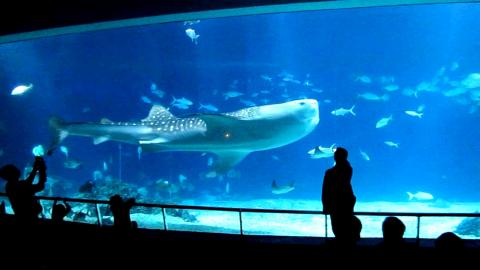The Environment and Animal Society of Taiwan (EAST) and several other environmental groups yesterday said that the National Museum of Marine Biology and Aquarium kept whale sharks in small tanks that caused their health to deteriorate.
The group urged the aquarium to release the last remaining whale shark and not to bring in new ones.
According to EAST director Chen Yu-min (陳玉敏), the aquarium in Pingtung County has held three whale sharks — a species that has been listed on “Appendix II” of the Convention on International Trade in Endangered Species of Wild Fauna and Flora and labeled “vulnerable” by the International Union for Conservation of Nature — in captivity since April 2004, in the name of education and marine research.

Photo courtesy of the Environment and Animal Society of Taiwan
The groups’ investigation suggested that one whale shark died of poor health in 2007, another was secretly released into the ocean without undergoing rehabilitation or tagging for follow-up research the same year and the remaining 6m-long whale shark was being kept in a small tank, Chen said.
Showing a video clip and photographs of the remaining whale shark at a press conference in Taipei yesterday, Chen said that it had scars on its tail from hitting the tank’s walls and reefs in the tank because the tank was too small.
Citing data from whale shark tag release research conducted by Chuang Shou-cheng (莊守正), an associate professor at the National Taiwan Ocean University’s Department of Environmental Biology and Fisheries Science, the groups said that whale sharks often stay in deep waters — about 5m to 10m below the sea surface, but sometimes submerge to 80m below sea level, and that they can migrate up to 34km a day.
Keeping the whale shark in its current tank, which is 33m long, 22m wide and about 8m to 12m in depth, is like keeping it in a jail cell, the groups said, adding that the video showed the whale shark swimming in the tank in the same circling direction.
It took the whale shark about 50 to 80 seconds to swim a circle in the tank, which meant that it would swim about 360 to 576 circles just in the eight hours that the aquarium was open daily, the groups said.
Lai Wei-jen (賴威任), office director of the Kuroshio Ocean Education Foundation, said whale sharks have a life span of about 70 to 100 years in the ocean, but data from an aquarium in Okinawa, Japan, showed that 16 whale sharks kept in captivity during the period from 1980 to 1998 lived for an average of only 16 months.
Lee Chan-rong (李展榮), an official at the aquarium, said the aquarium has proposed to tag release the remaining whale shark after it introduces a new small whale shark into the tank, allowing the bigger whale shark to teach the new whale shark for a while.
The groups urged the government not to approve the proposal to introduce any whale sharks, and to ask the aquarium to tag release the remaining whale shark as soon as possible.

Chinese Nationalist Party (KMT) Chairman Eric Chu (朱立倫), spokeswoman Yang Chih-yu (楊智伃) and Legislator Hsieh Lung-chieh (謝龍介) would be summoned by police for questioning for leading an illegal assembly on Thursday evening last week, Minister of the Interior Liu Shyh-fang (劉世芳) said today. The three KMT officials led an assembly outside the Taipei City Prosecutors’ Office, a restricted area where public assembly is not allowed, protesting the questioning of several KMT staff and searches of KMT headquarters and offices in a recall petition forgery case. Chu, Yang and Hsieh are all suspected of contravening the Assembly and Parade Act (集會遊行法) by holding

PRAISE: Japanese visitor Takashi Kubota said the Taiwanese temple architecture images showcased in the AI Art Gallery were the most impressive displays he saw Taiwan does not have an official pavilion at the World Expo in Osaka, Japan, because of its diplomatic predicament, but the government-backed Tech World pavilion is drawing interest with its unique recreations of works by Taiwanese artists. The pavilion features an artificial intelligence (AI)-based art gallery showcasing works of famous Taiwanese artists from the Japanese colonial period using innovative technologies. Among its main simulated displays are Eastern gouache paintings by Chen Chin (陳進), Lin Yu-shan (林玉山) and Kuo Hsueh-hu (郭雪湖), who were the three young Taiwanese painters selected for the East Asian Painting exhibition in 1927. Gouache is a water-based

Taiwan would welcome the return of Honduras as a diplomatic ally if its next president decides to make such a move, Minister of Foreign Affairs Lin Chia-lung (林佳龍) said yesterday. “Of course, we would welcome Honduras if they want to restore diplomatic ties with Taiwan after their elections,” Lin said at a meeting of the legislature’s Foreign Affairs and National Defense Committee, when asked to comment on statements made by two of the three Honduran presidential candidates during the presidential campaign in the Central American country. Taiwan is paying close attention to the region as a whole in the wake of a

OFF-TARGET: More than 30,000 participants were expected to take part in the Games next month, but only 6,550 foreign and 19,400 Taiwanese athletes have registered Taipei city councilors yesterday blasted the organizers of next month’s World Masters Games over sudden timetable and venue changes, which they said have caused thousands of participants to back out of the international sporting event, among other organizational issues. They also cited visa delays and political interference by China as reasons many foreign athletes are requesting refunds for the event, to be held from May 17 to 30. Jointly organized by the Taipei and New Taipei City governments, the games have been rocked by numerous controversies since preparations began in 2020. Taipei City Councilor Lin Yen-feng (林延鳳) said yesterday that new measures by